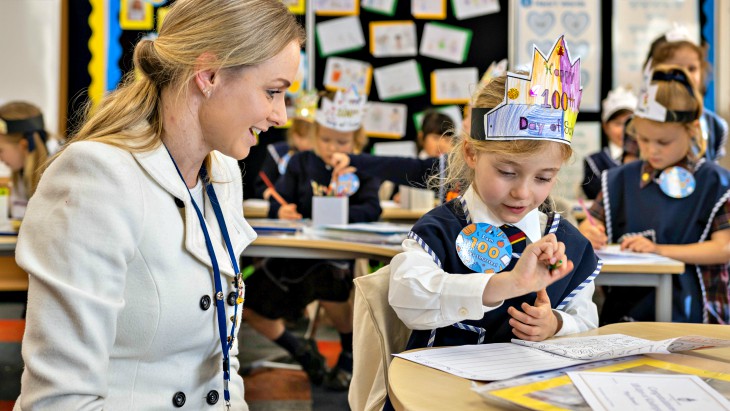Independence And Social Skills Are The Keys To School Readiness
- Preschoolers
Kids
Family

Preparing your child for school is not just about reading and writing. Guest post by Elizabeth Worsley, Head of St Catherine’s Junior School.
A great debate has been going on for many years regarding the perfect age to send a child to school. I remember having the same internal debate. My eldest daughter was one of those children who could legally start school just before she turned five. We had the choice of waiting a year so that she would be almost six when she started.
What is the correct choice? It is dependent on your child because each child is different! So instead of debating about the perfect age to send a child to school, we should look at what is the best school for the child and how we can help prepare them to start there.
Many parents spend a great deal of time trying to initiate reading and writing skills with their child. While it is good for your child to recognise letters, numbers and their name, reading and writing is not a prerequisite for starting school. The key to determining whether your child is school ready should be based on their independence and social skills.
Fortunately for all schools, most new Kindergarten students have previously attended preschool or daycare. I cannot speak highly enough of these centres in the way they prepare students for school. I recently visited a local preschool and had the privilege of seeing this firsthand. It was a delight to see the children happily engaged in playtime, small group work and activities on the carpet.
They knew how to wash and sanitise their hands, how to sit down to eat, and the importance of listening to and following instructions. In so many ways, these centres are doing the groundwork for parents. But what can you do to prepare your child for school?
In the term before their daughter is due to commence Kindergarten, we give parents this checklist to help them prepare:
-
Playdates – schedule as many play dates as possible. Children learn the skills of negotiation, sharing and taking their turn when they play together in unstructured situations.
-
Outside play – make sure your child has time to play outside. Visiting parks will not only help to develop their gross motor skills but also their social skills.
-
Independence skills – make sure your child can dress herself and put on a jumper or coat when it’s cold. Let her practise using her lunch box and drink bottle. Can she open them? Picnics in the park or even in the backyard are a great way to develop these skills.
-
Language skills – regularly reading to your child and encouraging them to ask questions is very important. Singing with your child is also helpful. Don’t worry, they don’t care what it sounds like! Receptive language skills are an essential part of child development and make that transition to the classroom easier.
-
Positive talk – talk to your child about the exciting things that will happen at school. Everything is new and it’s wonderful to see it all through the eyes of a child.
Finally, don’t be afraid to ask questions. When you talk to other parents and staff at the preschool, you will find that other people are experiencing the same things that you are. It will make you feel better!
Elizabeth Worsley
Head of St Catherine's Junior School
www.stcatherines.nsw.edu.au
More Education Advice
The Signs Of A Good Childcare Centre
Best Sydney Tutors For Kids
The NSW School Curriculum Is Getting A Huge Overhaul
Have you signed up to our newsletter? Join ellaslist to get the best family and kid-friendly events, venues, classes and things to do NEAR YOU!
Reviews


